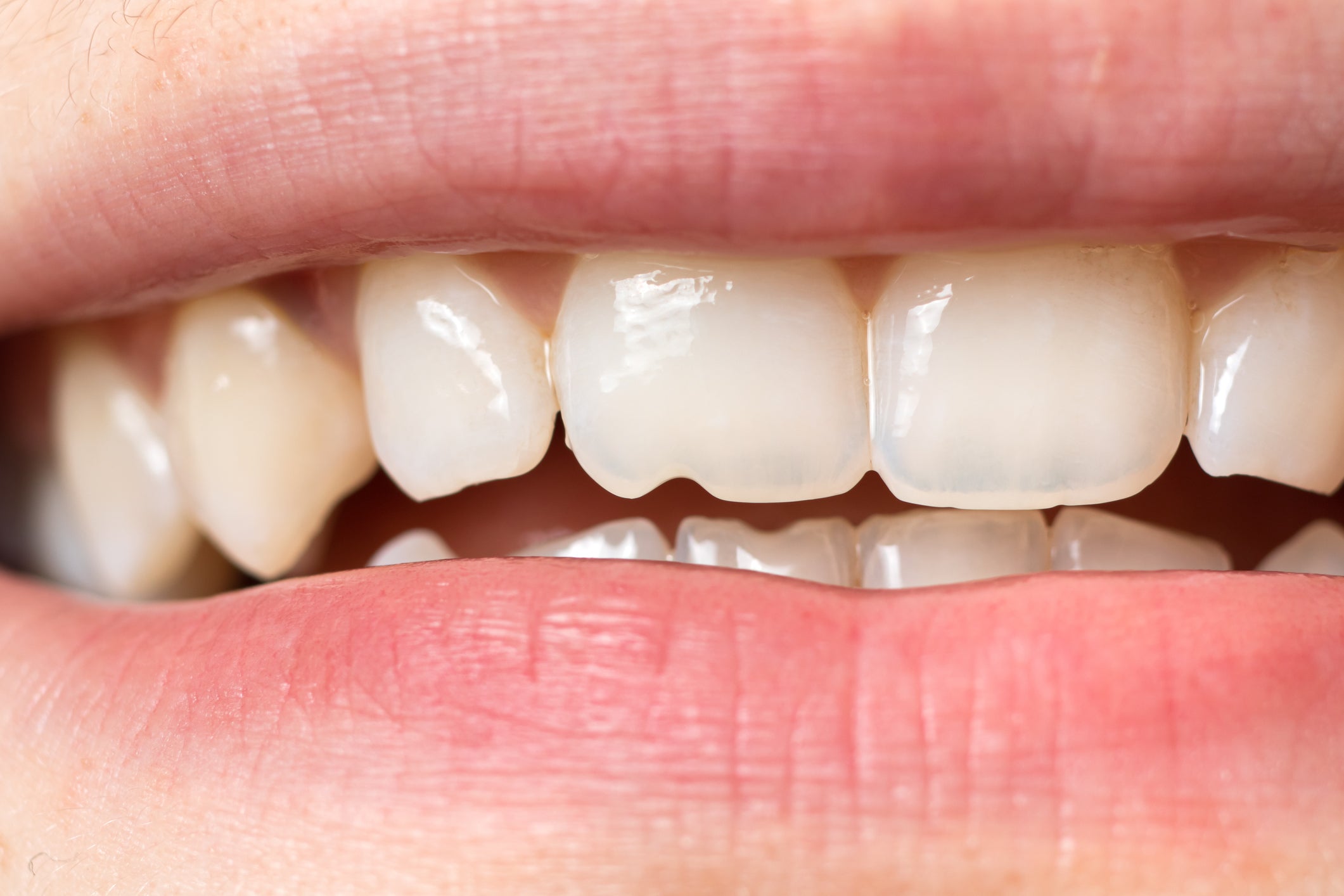-
Why Your Teeth Chip Away

Enamel, the hard outer covering of your teeth, is the strongest material in the human body. So why is it that your teeth can chip away? Explore the causes of chipped teeth and what factors increase your risk.
Causes of Chipped Teeth
Enamel is tough, but it has limitations. Here are some common situations that may cause your teeth to chip:
- Biting down on hard candy, ice, or non-food substances
- Getting in a car accident
- Falling on your face or getting hit in the mouth
- Clenching your jaw during waking hours or grinding your teeth when you sleep
Risk Factors for Chipped Teeth
Strong, healthy teeth shouldn’t chip and crack. If your teeth are prone to this problem, learn the possible reasons why so you can take steps to prevent chipped teeth:
- Genetics: Some people have genetic traits that undermine the strength of their tooth enamel. Unfortunately, you have no control over this risk factor.
- Poor diet: If you don’t supply your teeth with the minerals they need, they won’t be as strong. The best foods for a healthy smile contain calcium, protein, folic acid, fiber, and vitamins A and D. Include more fruits, vegetables, nuts, and low-fat dairy in your diet to increase your intake of these nutrients.
- Tooth decay and enamel erosion: Too much sugar and acid in your diet can decay and erode your teeth. Large fillings also tend to weaken the natural tooth material around them. To lower your risk, eat less candy, soda, juice, citrus fruits, and starches.
- Misaligned bite: Crooked teeth aren’t just a cosmetic concern. If your teeth don’t align properly, something as simple as chewing could chip or crack a tooth. Fortunately, braces can help fix this problem.
- Acid reflux: Stomach acid is potent enough to damage tooth enamel. If you have acid reflux, heartburn, or an eating disorder that causes frequent vomiting, your teeth could weaken significantly and be more vulnerable to chipping.
- Contact sports: Do you play football, hockey, rugby, or other contact sports? If so, you’re more likely to suffer mouth injuries. Protect your teeth, lips, and gums by wearing a mouthguard.
- Bruxism: Teeth grinding, also known as bruxism, can wear down enamel. This makes you more prone to chipping a tooth during your day-to-day activities. Protect your teeth by wearing a custom-made mouthguard while you sleep.
- Age: Tooth enamel naturally wears down over the years, increasing your risk of chipping a tooth as you age. If you’re over age 50, talk to your dentist about any additional precautions you should take.
If you need help repairing a chipped tooth, turn to Park 56 Dental. We offer veneers and composite fillings to fix chipped teeth pain-free. We also fit patients with custom Under Armour® mouthguards to help prevent chipped teeth. You’ll love receiving treatment in our spa-like New York dentist office, so don’t hesitate to schedule an appointment today! Contact us at (212) 826-2322 to get started.
-
Why You Have White Spots on Your Teeth

When you smile at yourself in the mirror, you want pearly white teeth to smile back. If you notice white spots on your teeth, you may wonder if it’s a temporary cosmetic problem or an indicator of a more serious health issue. Explore the reasons why you may have white spots on your teeth and how a dentist can help you prevent or treat the problem.
What Causes White Spots on Teeth?
Several problems may cause white spots to form on your teeth. Some of the most common factors include:
- Too much fluoride: Ingesting too much fluoride leads to a condition called fluorosis. This harmless condition is usually seen in children whose teeth are still developing. To prevent this, give young children fluoride-free toothpaste and instruct older children not to swallow their toothpaste.
- Improperly formed enamel: A condition called hypoplasia causes poorly developed tooth enamel in children, resulting in white spots and an increased risk of tooth decay. Smoking during pregnancy is one reason this can happen.
- Certain medications: Amoxicillin and other medicines taken to treat infections can weaken tooth enamel enough to allow white spots to form. This most often affects children whose teeth are still developing.
- Loss of mineral content: In adults, an opaque, chalky white spot is often the first sign of a cavity. It indicates that the acidic plaque on your teeth has compromised the enamel, which is now starting to decay.
- Poor diet: Not consuming enough calcium and other minerals weakens your enamel. Then, eating too many sugary or acidic foods eats away at your weakened teeth, leading to white spots and eventually cavities. Try eating more fruits, vegetables, nuts, and low-fat dairy, while reducing your intake of candy, soda, juices, citrus fruits, and starches.
- Poor oral hygiene while wearing braces: It’s common for white spots to develop on your teeth while wearing braces. After all, dental hygiene is more difficult when your teeth are covered with brackets and wires, so thorough brushing and flossing are more important than ever. You may also want to consider Invisalign as a metal-free way to straighten your smile.
Treatment for White Spots on Teeth
When it comes to keeping your teeth healthy and beautiful, prevention is the best medicine. If white spots have already appeared on your teeth, a dentist may be able to remove them, depending on the cause and level of deterioration. The most effective treatments include:
- Enamel microabrasion
- Teeth whitening
- Dental veneers
- Topical fluoride
- Composite fillings
If you want help removing white spots from your teeth, Park 56 Dental is here for you. We offer cosmetic and restorative dentistry services to renew your confident smile. Our world-class care and passion for helping our patients have earned us the title of NYC’s best dentist! Find out for yourself what makes us different—call us at (212) 826-2322 or schedule an appointment online today. We have served the 10022 zip code area for over 20 years.
-
The Best and Worst Christmas Foods for Your Teeth

Have you decided what to serve at your upcoming Christmas party or holiday feast? If you’re trying to prepare a healthier menu, consider how different foods affect your oral health, not just your waistline. Here’s a look at which Christmas foods are on the nice list and which naughty foods you should avoid.
Christmas Foods on the Nice List
- Turkey and ham: As long as you choose lean cuts with minimal additives, protein is considered good for your teeth. Turkey, in particular, is packed with phosphorus for healthy teeth. Then, ham is high in potassium, which helps your teeth use calcium more effectively.
- Cheese: No holiday buffet is complete without a cheeseboard. The good news is cheese is packed with calcium and protein for healthy teeth. It also neutralizes any acidity in your mouth to reduce the risk of cavities.
- Nuts: Mixed nuts make a great holiday snack. Like cheese, they’re high in calcium and protein and low in sugar. Their crunchy texture is also a plus.
- Raw vegetables: Set out the veggie platter and enjoy every bite, knowing you’re eating one of the best Christmas foods for your teeth.
- Apples: All fresh fruit is good for you, but apples are especially beneficial for oral health. Finish your meal with a few apple slices to scrub your teeth and stimulate your gums.
Christmas Foods on the Naughty List
- Chocolate and other candy: Sweets are high in sugar, which becomes acid in your mouth. This means all candy is bad for your teeth, from hard candy canes and toffees to soft caramels and chocolates.
- Eggnog: While many consider eggnog a holiday staple, it’s chockfull of sugar. The thick consistency of this drink also encourages the sugar to stick to your teeth, creating acids that cause tooth decay.
- Dried fruit: Even though it contains the word “fruit,” you should beware of this holiday treat. Dried fruit is surprisingly high in sugar and stubbornly sticks to your teeth. Choose fresh fruit for a healthier mouth this Christmas.
- Popcorn: Popcorn hulls are a danger to your teeth, but any added caramel or chocolate drizzle only worsens the effect. Keep toothaches at bay by brushing and flossing after eating popcorn to remove any remaining debris.
- Sugar cookies: In addition to being sugary, cookies also contain starches that get stuck in your teeth and feed the bacteria in your mouth. If you get a craving for cookies, try chewing sugarless gum instead. Your teeth—and your waistline—will thank you.
Along with eating the best Christmas foods for your teeth, remember to continue your oral care routine this holiday season. This includes seeing the dentist regularly. If it’s been more than six months since your last visit, schedule an appointment with Park 56 Dental before the New Year. We’ve been voted the best dentist in New York, and with good reason. Contact us today at (212) 826-2322 to experience our spa-like dentist office for yourself.
-
Why You Should Take Advantage of Your Dental Insurance

If you have dental insurance, your current plan will likely reset on January 1. Whether you pay for dental care through a benefits plan or use an FSA, don’t leave your hard-earned dental dollars on the table—schedule the dental services you need today!
Why Should You Use Your Dental Insurance?
- Coverage expires at the end of the year: Most dental plans cover two preventative visits per year and have an annual maximum. Coverage doesn’t roll over, so any unused benefits will go to waste.
- You’re already paying for it: Dental coverage through your employer deducts automatically from your paycheck. If you don’t visit the dentist, that money is simply wasted.
- Prevention is better than cure: Utilizing your dental insurance helps prevent oral health problems before they start. Even if you don’t need restorative or cosmetic services, you should still have your teeth cleaned and examined twice a year. Your plan should cover most or all of the cost, making it affordable to maintain a healthy smile.
How to Make the Most of Your Dental Benefits
- If your mouth is already in good shape, keep visiting the dentist every six months to keep it that way.
- If it’s been a while since your last appointment, meet with a dentist to determine your dental needs and what treatments are available. Getting everything done before the end of the year helps you make the most of your annual maximum.
- If you have periodontal disease or another chronic oral health problem, your dental benefits should make ongoing treatment more affordable.
How to Make the Most of Your Flexible Spending Account
A Flexible Spending Account (FSA) is a pre-tax way to fund qualifying medical expenses. You set it up through your employer and decide how much you want to contribute to the account each month. In general, FSA funds expire at the end of the year, so you’ll lose any money you haven’t spent once January 1 rolls around. Here’s how to make sure you use these funds to the fullest:
- Plan carefully during open enrollment to avoid overfunding your FSA.
- Talk to your dentist in the summer or fall about any procedures you might need soon. You may be able to use your FSA to pay any associated co-pays or co-insurance.
- Schedule any services you need before the end of the year to ensure your FSA dollars are used in time.
- Remember that FSAs typically cannot fund cosmetic procedures, such as teeth whitening, veneers, or cosmetic braces.
Park 56 Dental accepts insurance plans from Delta Premier, Delta PPO, MetLife, Guardian, Aetna, and Cigna. We also work with CareCredit and Chase Healthcare Advance for patients who don’t have insurance coverage. If you have any other questions regarding finances and dental care, feel free to ask. Then, contact us at (212) 826-2322 to schedule an appointment at our spa-like dentist office. We have served the 10022 zip code area of New York since 1997.
RECENT POSTS
categories
- Uncategorized
- Cosmetic Dentistry
- Veneers
- Healthier Teeth
- Teeth Whitening
- Dental Health
- Video
- Dental Emergencies
- Invisalign
- Dental Implants
- Root Canal
- Sedation Dentistry
- Infographic
- Dental Crowns and Bridges
- Dental Anxiety
- Gum Disease
- COVID-19
- Bad Breath
- New York Dentist
- Cut out sugar
- General Dentistry
- Oral Health
- Oral Cancer
- Dry Mouth
- Gum Health
- Toothache
- Dental Sealants
- Cavities
